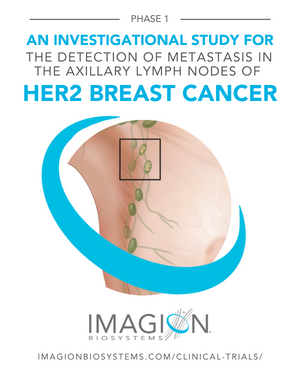Clinical Trial
Progressing a New Class of Imaging Agents Through Clinical Development
MagSense® HER2 Imaging Agent (MSH2IA) Phase II Clinical Study – IBI010105
Imagion Biosystems is preparing its IND submission for a Phase II Clinical Study to investigate the pharmacokinetics, dosing, imaging schedule, and diagnostic performance of the MagSense® Human Epidermal Growth Factor Receptor 2 (HER2) Imaging Agent (MSH2IA) using magnetic resonance imaging in participants with HER2+ Breast Cancer for the assessment of tumor involvement in the lymph nodes.
Imagion is the first company developing molecularly targeted cancer specific imaging agents for use with MRI. MSH2IA is a first-in-class molecular imaging product candidate that is intended to detect tumors more accurately than relying solely on anatomical abnormalities seen in conventional imaging. With its tumor targeting, MSH2IA produces MRI images that are differentiable between an abnormal lymph node and a normal node in HER2 positive breast cancer patients undergoing axillary imaging.
Clinicians and institutions interested in becoming an investigator or study site should contact info@imagionbio.com to learn more.
If you are interested in learning more, please contact Imagion Biosystems
MagSense® HER2 Imaging Agent (MSH2IA) Phase I Clinical Study – IBI010103
Imagion Biosystems has concluded an investigational Phase I study of a novel molecular imaging agent. This first-in-human study investigated the safety of the MagSense® HER2 Imaging Agent (MSH2IA) and the feasibility of MRI detection of metastatic disease in the axillary nodes in patients with HER2-positive (HER2+) primary breast cancer.
MSH2IA is specifically designed for breast cancer patients who test positive for the Human Epidermal Growth Factor Receptor 2 (HER2). This study has shown that this molecular MRI contrast agent is safe and has the potential to non-invasively determine if breast cancer has spread to the lymph nodes.
Details of the study can be found at Australia New Zealand Clinical Trial Registry
See our most recent data from the SABCS 2023 scientific poster.

